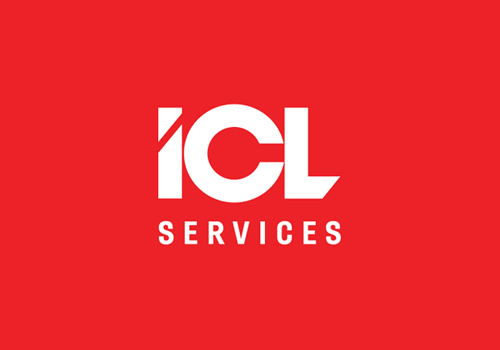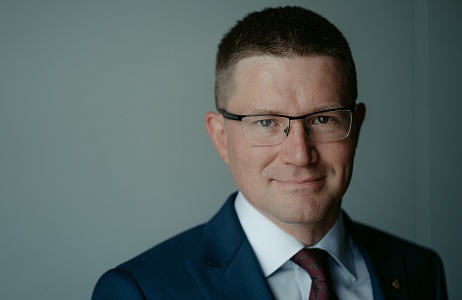Готово!
Скоро материал придет на указанную электронную почту. Также подписывайте на нас в Facebook
Ok
"Implementing industry-specific solutions is a requisite": ICL Services' experience in cross-industry and international business development
In an interview with Alexey Klochkov, Managing Director of Terrasoft, Ruslan shared the experience of ICL Services in cross-industry and international business development.
— The market realized its need for industry-specific IT solutions a long time ago, so the demand for them is constantly growing. Players with the same capabilities and narrow niche potential are forced to search for ways to get them ahead of their competitors since rules and standards are equal for all market players. Such an approach saves a significant amount of time for IT companies and their customers and allows the customer to make fewer mistakes in the process of implementation or avoid them altogether. Furthermore, it’s an opportunity to get positive results faster and improve business performance, taking advantage of the experience of those who worked in the industry before you and succeeded.
First of all, when implementing projects, it is important to determine the right implementation methodology (Waterfall, Agile — editor’s note), for example, based on the requirements of the projects and the level of possible risks.
In addition, having deep industry specifics, we aim to form teams that close all knowledge gaps and are able to speak the same language with representatives of the customer. Of course, this increases the chances of success for the project within its deadline and budget. By which principles are we guided? First, we understand industry specifics. Secondly, we speak the same language with the customer. And thirdly, we know the norms of industry regulators and are able to transfer best practices from working with foreign customers to create added value.
— Ruslan, from your point of view, could you tell us about the most interesting project, where the experience you gathered after its completion can help your colleagues at the very beginning of the cross-industry path?
— Retrospectively, we have a lot of experience in retail, as well as several competence centers — a global center for products that we provide to global customers, and a local center that supports customers in the Russian market. These competence centers bring together best practices and industry knowledge, which have come in very handy in the last year and a half, during the pandemic. Our customers in logistics grew rapidly during this period, and their growth was noticeable primarily in regard to the postal terminals network. Also, huge transformations took place in the HoReCa segment due to changes in working conditions and restrictions caused by COVID.
Here is what we did: we quickly transferred all the accumulated experience in the retail — cash register equipment support, customer contact points support, etc. — to the postal network, since there are many large logistics and E-commerce companies among the customers of ICL Services. We were getting requests for either transformation or aggressive network growth. Our high level of expertise in retail helped us a lot to work out these requests in an efficient manner. Let’s take the case of Khalva (Khalva, a large network of automated storage and postal terminals — editor’s note) for example: we helped increase the growth rate of the postal terminals network in Russia, both quantitatively and geographically. In a year and a half, ICL Services engineers have installed more than 2,000 postal terminals in more than 477 cities in Russia, and specialists travel to several hundred terminals every month to provide technical support. The quality of the service provided is constantly monitored by the service management team; the actual SLA level is 98%, which corresponds to the agreement between ICL Services and the customer.

I can say with a high degree of confidence that the rapid growth of ICL Services in the market of support, maintenance, creating solutions for postal terminals is caused by the effective use of accumulated international expertise in the Russian market.
— How do you choose solutions and technologies to implement projects? Does this choice depend on the industry where your customers operate? What requirements do customers mostly have for the solutions?
— Technologies are directly related to the needs of the customer. We will not migrate backup infrastructure to the cloud if the customer’s need is based on using physical drives in a data center. Consequently, we form the optimal technology stack based on the customer’s needs, and, using our cross-industry experience and expertise, package all of the above into a turnkey solution. In developing solutions, we focus on the business development strategy; we use best practices, focus on creating added value for the customer, minimize risks of downtime and reduced efficiency of the customer’s business, and we try to always choose the best solution among all possible technological options.
As a rule, the choice of technology and solutions does not depend on the industry. Hardware and software complexes have «life» of their own and, from a mathematical standpoint, cover the needs of any business within their performance and computing power. Nevertheless, for a number of industries, certain assumptions about the technology stack do exist. Take retail as an example: computing speed and fault tolerance requirements are noticeably higher in retail than in other industries in the market.
When it comes to solution requirements, we often deal with two types of cases. In the first case, the customer has a clear development strategy and a consistent plan, according to which a solution based on best practices will be formed. In the second case, the customer does not know or does not even realize their needs. If that is the case, we help develop IT infrastructure and services strategy and operate not only as a provider or integrator but also as a business partner.
— The scale of ICL Services’ international presence is mind-boggling. What ideas and concepts that you use in your work with foreign customers have been successfully «imported» and implemented in the Russian market?
— First, let me tell you about the whole approach then: IT can be simple, accessible, understandable, flexible and, most importantly, with an easily predictable total cost of ownership . About 7–8 years ago, when we started to be active in the Russian market, it was a transformation for us, because before we developed managed services only for Western customers. We felt the difference in the idea of what managed services are in general, and, in my opinion, we were able to do a lot to convey, explain, and simplify.
Let me give you an example. The Russian grocery retailerbranch of Auchan approached us with an inquiry for a solution that would increase customer traffic in stores. We conducted an analysis of international experience in other companies, integrated what we found, taking into account the requirements and specifics, and developed a hardware and software solution, which included self-service kiosks and entrance group gates designed by our Service Desk 24/7, a team that monitors the state of the equipment, field engineers and others. Everything you see in the self-service area of a store today is all our solutions. What is new is that we offered customerAuchan not just a solution to complete the task, but a full-fledged service. Let’s assume that grocery retailAuchan pays RUB 1,000 per entrance gate per month. The business case estimates are easy to make: How many supermarkets are there? How many additional cash registers do we plan to introduce to increase traffic? We multiply the number of months of service by 1,000 and get the total cost of ownership. Then you just need to look at how much is the increase in traffic and gross profit and business case calculations are done! Thanks to a large international background, we have provided a flexible, intuitive service without unnecessary immersion in IT processes.
Another approach that we have successfully implemented is continual service improvement culture, or customer co-creation. We give the customer a guarantee that the cost of services will not increase every year but reduce, despite inflation and rising wages. This is a standard approach in the Western world. During the discussion phase, we tell the customer that in order to reduce costs we are going to come up with suggestions for improvements in processes and maintain constant communication with the team to reduce unnecessary operations. For example, at the initial stage of work, together with the customer, we analyzed the number of incidents on their service infrastructure. We noticed that there are 20% recurring incidents related to the lack of a patch. We don’t just fix these incidents but put out there an offer to implement patch management to the customer. So, with the customer, we discuss and coordinate the implementation project, which will be conducted at the customer’s costs; however, we guarantee support services costs reduced and total costs of implementing the process covered by the end of the year. It’s a «win-win» situation: the customer pays less and has the accessibility of their environment increased, and we preserve the profitability of service for the customer at a lower cost and increase our own productivity.

All of this is made available through a high level of focus: at monthly or quarterly meetings we have discussions and check with the customer whether we are going in the right direction.
It is important to note that this culture of continuous improvement is not feasible on short projects. Such culture needs to be nurtured, and it takes some time to implement it. One has to get used to the customer and adjust. Same as in marriage, where the first 6 months it’s all honeymoon, and then leaving a toothpaste tube open on a sink suddenly becomes a big deal. Therefore, introducing CSI culture shows results only after one or two years of cooperation.
— Okay, that’s interesting! Is there anything in your experience with Russian customers that you have been able to export to foreign markets?
— Russian customers are often under very serious price pressure and, as a consequence, they come with a request to reduce prices. We started pondering what we could do, so that we don’t just automate the process but apply other approaches to maintain the IT infrastructure. In 2018, a new Delivery Excellence division was created within the company in order to optimize and reduce the cost of the solutions offered without compromising on their quality. The main task of the division is to look for potential areas of improvement. Ideas aimed at optimizing labor come from company employees themselves. One such idea was to automate some of the works done by company employees in regard to providing services to customers. In order to automate the distribution of tasks when working on service projects, the company’s experts created an automatic smart assistant (ASA — editor’s note). We didn’t want to eliminate human labor but rather to redirect human resources to more complex intellectual work, pulling out of routine, repetitive tasks. Different solution modules rely on machine learning technologies, RPA, interaction with ITSM, and other related systems.
In addition, the ASA, same as a «web spider» or «web crawler,» gathers information from various sources. For example, what experience the employees had on this service project, what incidents took place and how the employees solved them, what availability and skills they have. As soon as notification on the incident arrives, the system quickly determines whom to send the incident to for processing. Thus, both reaction and solution time are reduced. Then we added various modules. Now we are working on the possibility of predictive analytics and are moving towards self-healing systems.
Thanks to ASA, we were able not only to offer the Russian market a high-quality service on a set budget but also to create a standard of work for the international market. We offered these solutions to our key business partner Fujitsu, who incorporated them and made these solutions part of their own service standards.
This decision won us a number of awards in 2020, including the Golden Mercury National Entrepreneurial Award and the Time for Innovation 2020 Award.
— Let’s talk about future. What are the key areas of work that you now focus on? What has to be developed first?
— That’s a very timely question. The other day I took part in a survey on Linkedin, and there were questions about areas of a company transformation. It would appear that in current circumstances remote working, the ability to work from anywhere, moving to the cloud, and other things should come first on the agenda; surprisingly, it is talent management that is of utmost importance according to this survey. There won’t be more human resources, so the first-priority task for me is to look at our talent strategy and the way we work with people today.

We also plan to review our location strategy. One should already be thinking about how to get the best talents hired from anywhere in the world. We are working on team-building projects in new countries, primarily in those where there is potential growth in the number of qualified employees in the future.
Technological transformations, migration to the cloud, and others only come third at this point. However, this is also an important task, finding a solution to which will allow us to ensure the effective work of the company in the new environment.
Related news
- 23 July
ICL Services website in TOP of the Runet
The «RuNet Rating» contest is held annually for the past five years. During this time the project has become well known to virtual community, and today this is the most authoritative websites contest in RuNet.
- 21 March
ICL Services is among the TOP 100 best outsources of the planet
ICL Services is in the Global Outsourcing 100 top list by IAOP for the third time in a row.
- 15 November
ICL Services Hits Top-3 Global Service Desk Providers
The rating is provided by Service Desk Institute (SDI), an influential international organisation.
- 17 September
ICL Services expert wins the leaders of Russia contest
One of our key specialists, Timur Kaidanny, became the winner in the super final of the federal «Leaders of Russia» contest where he represented the Republic of Tatarstan.
Stay informed
Subscribe to our newsletter and keep up with our latest news

